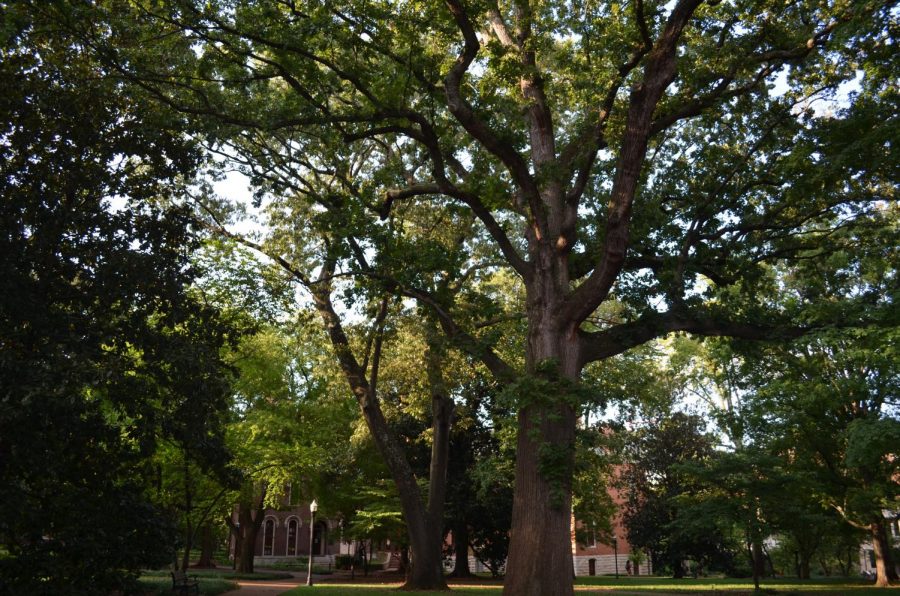A known white nationalist occupies an office on Vanderbilt’s campus, our campus, for life. She walks through our halls, carrying one of the most prestigious honors a professor can receive, while spreading her racist views to the world. Yet, Vanderbilt, a school that claims to value racial equality, has refused to take that honor away.
As a white, Jewish woman who grew up in a predominantly white, Jewish town, I have had the privilege to walk through life without being discriminated against based on the color of my skin. I have heard stories from my Black peers regarding the injustices and racial discrimination they experience on a daily basis; as we know, many stories like these end in fatality, like in the case of George Floyd. In the midst of national protests and petitions, I now open social media to find education I could have never received from a textbook. I witness reality, and it’s not equal. This inequality is something I’ve always known to exist, even when it wasn’t highlighted in the media. But I didn’t realize how much inequality exists at the place I chose to get my education until the past few days, when I’ve learned of Vanderbilt’s true values regarding racial equality; they are not honorable.
When I opened Instagram last week, I expected the same flood of education and information about racial equality that my feed has expressed lately. What I did not expect was to see a post from my best friend at Vanderbilt that showed Professor Emerita Virginia Abernethy and a petition to remove that title alongside it. When I searched her name on Google, I immediately saw why.
Abernethy was a professor at Vanderbilt for 20 years and was awarded the title of Professor Emerita, an honor given to prestigious retired professors who are “expected to contribute to the academic prestige of the institution by maintaining an ongoing association with it even after retirement.” This honorable title also gives Abernethy an office for life on Vanderbilt’s campus, amplifying her continued association with Vanderbilt as an institution.
As I scrolled further, my eyes widened with astonishment at the words I was reading: “[Abernethy] has a long history of alliances with groups such as the racist political party American Third Position (renamed the American Freedom Party in 2013) and the white nationalist Council of Conservative Citizens (CCC).” Each sentence was worse than the last. She stated that she supports “the abolishment of all forms of government-mandated and corporate-mandated racial discrimination, such as affirmative action, quotas, and all forms of ‘racial sensitivity training.’” She’s also stated that she is an ethnic separatist, someone who believes in separating and excluding people from the majority group based on race and culture. Abernethy has also expressed her belief in returning to a “traditional family unit,” disapproving of homosexuality and belongs to a political party that was founded and run by neo-Nazis.
I truly do not understand how a woman who supports racial discrimination and has been called a white supremacist and neo-Nazi could also be called Professor Emerita. Although she denies being a white supremacist or neo-Nazi, her ideals align with those of segregation and racism. How could my university, a school that stated in an email to all Vanderbilt students, “Our statement last week reflected Vanderbilt’s long-held position that we do not tolerate racism, prejudice, hatred or violence in any form,” support Abernethy and her beliefs? So, I inquired.
I emailed Interim Chancellor Susan Wente, expressing my concern for Vanderbilt’s support of a woman whose values directly oppose Vanderbilt’s, and suggested that the title of Professor Emerita be removed. My best friend also emailed Wente with these concerns, in the hopes that our solidarity would be a cause for alarm. Instead, we received identical copy-paste responses, stating that “Vanderbilt is committed to a safe and welcoming campus community, where diversity, equity and inclusion are core values.” This was followed by a disappointing conclusion: “Vanderbilt respects faculty speech rights, even when faculty say things with which we vehemently disagree.”
In addition to the ingenuine, identical responses, I felt as if my true concern was being overlooked. I never suggested that we should infringe on her right to free speech.
There is a distinction between employing someone with beliefs that contradict the school’s and honoring them as a person who represents our school.
Abernethy’s title as a Vanderbilt affiliate lends credibility to her hate speech and gives her a platform through which to spread her racist views. Removing this honorific title would show that Vanderbilt does not support these views. If Vanderbilt promotes equality and does not tolerate racism, why does our school honor a woman who promotes the opposite?
If the moral consequences of this decision are not understood, maybe a more superficial perspective will get Vanderbilt’s attention. Vanderbilt cares deeply about their reputation—their donations and contributions depend on it. Supporting a woman who believes in such racist ideals is, quite frankly, embarrassing. To take it a step further, I believe that the newfound infamy of Abernethy’s values could cause many to retract their support for Vanderbilt and potentially their money along with it.
More important are the social consequences of allowing Abernethy to hold this title; our Black community at Vanderbilt is not appropriately represented by their school if Vanderbilt continues to honor someone who outwardly associates with white supremacist groups. What does it say to my Black peers that Vanderbilt supports a woman who does not believe in their equality as humans? It creates an uncomfortable, unsafe environment for those directly affected by Abernethy’s words and actions, which are not only racist but also homophobic and anti-Semitic, at a school that strives to make everyone feel heard and represented.
The petition to revoke Abernethy’s title now has 855 signatures at the time I write this, including students, alumni and those who care about equality. My personal signature stands for more than just the removal of her honorable title; it stands for my Black, Jewish and LGBTQ+ peers who deserve representation from a university that proves commitment to its values instead of a university that hides behind blanket statements. It stands for my peers who deserve to feel comfortable and safe in their school environment. It stands for honoring those who believe in racial justice. And although I will never experience discrimination based on my skin, I know without a doubt that it stands for equality.








